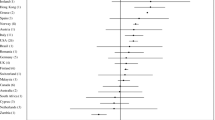Results of studies and psychological treatment work with children who suffered during the terrorist act in Beslan (2004) are used to describe the characteristics of one of the typical sequelae of psychological trauma in children – regression, i.e., reversion to types of behavior typical of earlier age periods. The stages in provision of psychological support to these children during the post-traumatic period (over two years) using play-based approaches, various pedagogic approaches, including restoration of lost skills, are discussed. The authors regard the cultural aspect as being of particular importance for all approaches.
Similar content being viewed by others
References
A. L. Venger, E. I. Morozova, and V. A. Morozov, “Psychological assistance for children and adolescents in extreme situations (studies of victims of the terrorist action in Beslan),” Mosk. Psikhoter. Zh., 1 (2006).
L. S. Vygotskii, “Thought and speech,” in: Coll. Works in Six Volumes [in Russian], Pedagogika, Moscow, Vol. 2, (1982), pp. 5–361.
L. S. Vygotskii, “The history of the development of higher mental functions,” in: Coll Works in Six Volumes [in Russian], Pedagogika, Moscow, Vol. 3, (1983), pp. 5–328.
L. S. Vygotskii, “The question of age,” in: Coll. Works in Six Volumes [in Russian], Pedagogika, Moscow, Vol. 4 (1982), pp. 244–268.
D. B. Elkonin, Selected Works in Psychology [in Russian], Pedagogika, Moscow (1989).
U. Yul and R. M. Williams, “Intervention strategies in mental traumas occurring as a result of large-scale catastrophes,” in: Child and Adolescent Psychotherapy [in Russian], D. A. Lein and E. Miller (eds.), Piter, St. Petersburg (2001), pp. 275–308.
A. C. MacFarlane, “Family functioning and overprotection following a natural disaster: the longitudinal effects of post-traumatic morbidity,” Aust. New Z. J. Psychiat., 21, 210–218 (1987).
Author information
Authors and Affiliations
Corresponding author
Additional information
Translated from Zhurnal Nevrologii i Psikhiatrii imeni S. S. Korsakova, Vol. 109, No. 12, Iss. I, pp. 24–28, December, 2009.
Rights and permissions
About this article
Cite this article
Venger, A.L., Morozova, E.I. Post-Traumatic Regression in Children (data from psychological work in Beslan, 2004–2006). Neurosci Behav Physi 41, 177–182 (2011). https://doi.org/10.1007/s11055-011-9397-6
Published:
Issue Date:
DOI: https://doi.org/10.1007/s11055-011-9397-6



